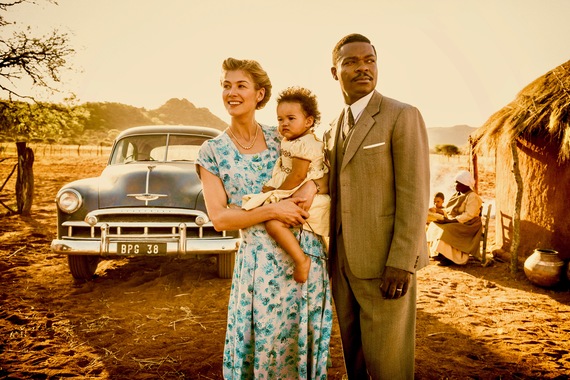Love across racial lines, especially when it involves British aristocracy, is a theme that's been close to director Amma Asante's heart. She tackled the subject gracefully in her romantic period piece Belle. With that same artistry, sensitivity and flair, she delves into another regal mixed-relations love story that's based on fact. You can throw out conventional wisdom and characters and embrace this very unique tale.
According to the book Colour Bar: The Triumph of Seretse Khama and His Nation, by Susan Williams, the facts, romance, drama and intrigue play out this way:
In the late 1940s, Seretse Khama (David Oyelowo, Selma), the Prince of Bechuanaland (a British protectorate that became Botswana), is studying law at Oxford. He goes to a mixer where he meets a beguiling white office clerk, Ruth Williams (Rosamund Pike, Gone Girl). Something clicks. A mutual love of jazz heats things up. A strong attraction blinds them to the naysayers who show disdain.
In 1948 they marry, an event that her closed-minded dad (Nicholas Lyndhurst) vehemently opposes. Headlines in the papers that year in post-World War II London read, "Black King, White Queen." And that is not a compliment. The British government is outraged, but only half as much as the South African government, which is just beginning to shepherd in apartheid, legal segregation of the races, as their neighboring country is flaunting interracial marriage.
The couple flies back to Bechuanaland and neither are well received. Khama is in line to become the next king of his tribe, but that's in jeopardy now, thanks to a scheming Uncle Tshekedi (Vusi Kunene) and a community that is in shock. The British government gives the lovers a hard time too, figuring out elaborate ways to keep them apart, even as Ruth becomes pregnant. It's a war of wills. The world is against the black prince and his white wife. Antagonism from governments, families and Khama's own people takes its toll. Who will win?
The dramatic elements in this unique story are strong: Groundbreaking history. Social and racial issues boil over. Political implications are on an international level. European countries, like Britain, salivate over the gemstones and precious metals that are ripe in Africa, and their colonialism gets exposed. Both blacks and whites act with narrow-minded rancor. Family members turn against each other. As this firestorm of strife plays out, an intriguing, forbidden love story develops. It worked for Shakespeare's Romeo and Juliet. It works here.
Guy Hibbert's (Eye in the Sky) approach to the script is low-key. He lets the romance prevail, prejudice of historical proportions becomes a weapon and those who use it become the villains. The sincerity of this love story is never in question. The characters just play out their parts, face insurmountable odds, and as they do the audience becomes engaged. Credit goes to director Assante for showing great reserve and style while letting the story unfold. She also finds a way to provoke earnest performances from the entire cast. Every incident, from love at first sight to power play meetings with British officials, is engineered aptly.
Assante's efforts get a great assist from: The alluring cinematography by Sam McCurdy (Game of Thrones) that makes the African plains and British streets equally evocative. Keen production design by Simon Bowles (Belle) fits the time and places. Stately period costumes by Jenny Beavan (The King's Speech) and Anushia Nieradzik (Belle), give Oyelowo's suits a regal look and Pike's flowing dresses a mid-century ladylike appeal. Editors Jonathan Amos (Scott Pilgrim Vs. The World) and Jon Gregory (Mr. Turner) endow the film with a rhythm that makes sense in bustling London and quiet Bechuanaland too. The musical score, by Patrick Doyle (Sense And Sensibility), remains exquisite throughout.
David Oyelowo produced this noble film and it's easy to see why he was attracted to the story. He has portrayed stately men in so many roles (Selma, Queen of Katwe) that his sensibility is ideal for that of a prince being denied his rightful ascension to the throne. The character and the actor mesh perfectly. Through the worst, Khama exhibits a dignity that is both believable and unshakeable.
Pike as the woman determined to make her new community her new family, regardless of the challenges, maintains a stoic majesty. On the other hand, Vusi Kunene as the devious uncle and Jack Davenport as British diplomat Alistair Canning, who kowtows to South Africa's determination to thwart the romance, are fitting adversaries who must get their due.
This film eschews histrionics. In doing so, the filmmakers let the audience form their own opinions without browbeating them. And for those who think interracial romance is hardly controversial these days, ask white Prince Harry of Britain if he's having an easy time romancing his black girlfriend while in the public eye.
A United Kingdom is fascinating. It's a love story that was way ahead of its time.
Visit NNPA Syndication Film Critic Dwight Brown at DwightBrownInk.com.
